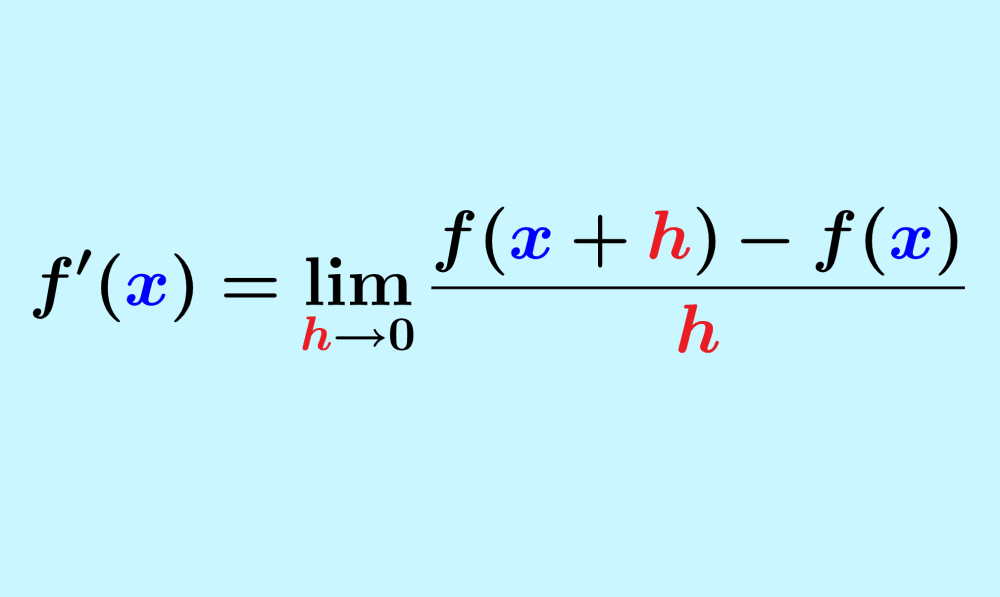Derivatives can be calculated using the definition of a derivative with limits. This definition consists of using the limit to find the slope of a secant line to two points in the function so that it approximates the value of the slope of the tangent line.
Here, we will look at 10 examples with answers of derivatives using limits. In addition, you will be able to test your knowledge of this topic with some practice problems.
How to find derivatives using limits
To find the derivative of a function using limits, we can use the following formula:
$$f'(x)=\lim _{h \to 0}\frac{f(x+h)-f(x)}{h}$$
This formula has the following important parts:
- $latexf(x+h)$. This means that we have to evaluate the given function using the input $latex x+h$.
- $latexf(x)$. This is the original function in terms of x.
- h in the denominator. This value must remain the same until we evaluate the limit or until it is simplified.
- $latex \lim _{h \to 0}$ is the limit. Generally, we solve it by substituting 0 for all the h that we find.
Therefore, to apply this formula, we have to start by finding the expression $latex f(x+h)$ in the numerator. Then, we subtract the original function $latex f(x)$.
Generally, we can simplify the h in the denominator with the h in the numerator. Finally, we use $latex h=0$ to solve the limit (this will work in most cases, but not always).
10 Examples of derivatives by using limits
Each of the following examples is solved by applying the formula for a derivative using limits. Try to solve the examples yourself before looking at the answer.
EXAMPLE 1
Find the derivative of $latex f(x)=8x$ using limits.
Solution
To find the derivative of a function with limits, we have to use the following formula:
$$f'(x)=\lim _{h \to 0}\frac{f(x+h)-f(x)}{h}$$
Therefore, we use the function $latex f(x)=8x$ to rewrite the numerator, and we have:
$$f'(x)=\lim _{h \to 0}\frac{8(x+h)-8x}{h}$$
$$f'(x)=\lim _{h \to 0}\frac{8x+8h-8x}{h}$$
$$f'(x)=\lim _{h \to 0}\frac{8h}{h}$$
Now, we can simplify the h in the numerator with the h in the denominator:
$$f'(x)=\lim _{h \to 0}(8)$$
Since we no longer have any h, we simply remove the limit:
$latex f'(x)=8$
EXAMPLE 2
Use limits to find the derivative of $latex f(x)=x^2$.
Solution
We use the following formula to find the derivative:
$$f'(x)=\lim _{h \to 0}\frac{f(x+h)-f(x)}{h}$$
Now, we use $latex f(x)=x^2$ in the numerator, and we have:
$$f'(x)=\lim _{h \to 0}\frac{(x+h)^2-x^2}{h}$$
$$f'(x)=\lim _{h \to 0}\frac{x^2+2hx+h^2-x^2}{h}$$
$$f'(x)=\lim _{h \to 0}\frac{2hx+h^2}{h}$$
Factoring the h from the numerator and simplifying with the h from the denominator, we have:
$$f'(x)=\lim _{h \to 0}\frac{h(2x+h)}{h}$$
$$f'(x)=\lim _{h \to 0}(2x+h)$$
We can solve the limit by substituting $latex h=0$ into the expression:
$latex f'(x)=2x+0$
$latex f'(x)=2x$
EXAMPLE 3
Find the derivative of $latex f(x)=4x^2+5$ using limits.
Solution
We use the formula for a derivative by limits:
$$f'(x)=\lim _{h \to 0}\frac{f(x+h)-f(x)}{h}$$
To solve, we use the function $latex f(x)=4x^2+5$ in the numerator of the formula:
$$f'(x)=\lim _{h \to 0}\frac{(4(x+h)^2+5)-(4x^2+5)}{h}$$
$$f'(x)=\lim _{h \to 0}\frac{4(x^2+2hx+h^2)+5-4x^2-5}{h}$$
$$f'(x)=\lim _{h \to 0}\frac{4x^2+8hx+4h^2+5-4x^2-5}{h}$$
$$f'(x)=\lim _{h \to 0}\frac{8hx+4h^2}{h}$$
We can factor out the h in the numerator and simplify with the h in the denominator:
$$f'(x)=\lim _{h \to 0}\frac{h(8x+4h)}{h}$$
$$f'(x)=\lim _{h \to 0}(8x+4h)$$
To solve the limit, we substitute $latex h=0$ into the expression:
$latex f'(x)=8x+4(0)$
$latex f'(x)=8x$
EXAMPLE 4
Determine the derivative of $latex f(x)=3x^2+5x$ using limits.
Solution
We start with the following formula:
$$f'(x)=\lim _{h \to 0}\frac{f(x+h)-f(x)}{h}$$
Now, we use the function $latex f(x)=3x^2+5x$ in the numerator, and we have:
$$f'(x)=\lim _{h \to 0}\frac{(3(x+h)^2+5(x+h))-(3x^2+5x)}{h}$$
$$f'(x)=\lim _{h \to 0}\frac{3(x^2+2hx+h^2)+5x+5h-3x^2-5x}{h}$$
$$f'(x)=\lim _{h \to 0}\frac{3x^2+6hx+3h^2+5x+5h-3x^2-5x}{h}$$
$$f'(x)=\lim _{h \to 0}\frac{6hx+3h^2+5h}{h}$$
By factoring the h from the numerator and simplifying with h in the denominator, we have:
$$f'(x)=\lim _{h \to 0}\frac{h(6x+3h+5)}{h}$$
$$f'(x)=\lim _{h \to 0}(6x+3h+5)$$
To solve the limit, we use $latex h=0$ and we have:
$latex f'(x)=6x+3(0)+5$
$latex f'(x)=6x+5$
EXAMPLE 5
Find the derivative of $latex f(x)=4x^2-7x$ using limits.
Solution
We have the following formula:
$$f'(x)=\lim _{h \to 0}\frac{f(x+h)-f(x)}{h}$$
Therefore, we use the function $latex f(x)=4x^2-7x$ in the numerator to rewrite it:
$$f'(x)=\lim _{h \to 0}\frac{(4(x+h)^2-7(x+h))-(4x^2-7x)}{h}$$
$$f'(x)=\lim _{h \to 0}\frac{4(x^2+2hx+h^2)-7x-7h-4x^2+7x}{h}$$
$$f'(x)=\lim _{h \to 0}\frac{4x^2+8hx+4h^2-7x-7h-4x^2+7x}{h}$$
$$f'(x)=\lim _{h \to 0}\frac{8hx+4h^2-7h}{h}$$
We can factor the h in the numerator to simplify with the h in the denominator, and we have:
$$f'(x)=\lim _{h \to 0}\frac{h(8x+4h-7)}{h}$$
$$f'(x)=\lim _{h \to 0}(8x+4h-7)$$
Finally, we solve the limit, using $latex h=0$ and we have:
$latex f'(x)=8x+4(0)-7$
$latex f'(x)=8x-7$
EXAMPLE 6
Find the derivative of the function $latex f(x)=6x-x^2$.
Solution
We start with the formula for derivatives by limits:
$$f'(x)=\lim _{h \to 0}\frac{f(x+h)-f(x)}{h}$$
Now, we use the function $latex f(x)=6x-x^2$ in the numerator, and we have:
$$f'(x)=\lim _{h \to 0}\frac{(6(x+h)-(x+h)^2)-(6x-x^2)}{h}$$
$$f'(x)=\lim _{h \to 0}\frac{6x+6h-(x^2+2hx+h^2)-6x+x^2}{h}$$
$$f'(x)=\lim _{h \to 0}\frac{6x+6h-x^2-2hx-h^2-6x+x^2}{h}$$
$$f'(x)=\lim _{h \to 0}\frac{6h-2hx-h^2}{h}$$
We factor the h in the numerator to simplify with the h in the denominator:
$$f'(x)=\lim _{h \to 0}\frac{h(6-2x-h)}{h}$$
$$f'(x)=\lim _{h \to 0}(6-2x-h)$$
We use the value $latex h=0$ in the expression to solve the limit:
$latex f'(x)=6-2x-0$
$latex f'(x)=6-2x$
EXAMPLE 7
Find the derivative of $latex f(x)=x^3$ using limits.
Solution
We start with the following formula:
$$f'(x)=\lim _{h \to 0}\frac{f(x+h)-f(x)}{h}$$
Using the function $latex f(x)=x^3$ in the numerator, we have:
$$f'(x)=\lim _{h \to 0}\frac{(x+h)^3-x^3}{h}$$
$$f'(x)=\lim _{h \to 0}\frac{x^3+3x^2h+3xh^2+h^3-x^3}{h}$$
$$f'(x)=\lim _{h \to 0}\frac{3x^2h+3xh^2+h^3}{h}$$
Now, we can factor out the h from the numerator to simplify with the denominator:
$$f'(x)=\lim _{h \to 0}\frac{h(3x^2+3xh+h^2)}{h}$$
$$f'(x)=\lim _{h \to 0}(3x^2+3xh+h^2)$$
Using the substitution $latex h=0$, we can solve the limit:
$latex f'(x)=3x^2+3x(0)+0^2$
$latex f'(x)=3x^2$
EXAMPLE 8
Use limits to find the derivative of $latex f(x)=x^3+4x$.
Solution
We have the formula
$$f'(x)=\lim _{h \to 0}\frac{f(x+h)-f(x)}{h}$$
Then, we use the function $latex f(x)=x^3+4x$ in the numerator, and we have:
$$f'(x)=\lim _{h \to 0}\frac{((x+h)^3+4(x+h))-(x^3+4x)}{h}$$
$$f'(x)=\lim _{h \to 0}\frac{x^3+3x^2h+3xh^2+h^3+4x+4h-x^3-4x}{h}$$
$$f'(x)=\lim _{h \to 0}\frac{3x^2h+3xh^2+h^3+4h}{h}$$
Now, let’s factor out the h from the numerator to simplify:
$$f'(x)=\lim _{h \to 0}\frac{h(3x^2+3xh+h^2+4)}{h}$$
$$f'(x)=\lim _{h \to 0}(3x^2+3xh+h^2+4)$$
To solve the limit, we use the substitution $latex h=0$:
$latex f'(x)=3x^2+3x(0)+0^2+4$
$latex f'(x)=3x^2+4$
EXAMPLE 9
Use limits to find the derivative of $latex f(x)=\frac{1}{x}$.
Solution
Let’s use the formula:
$$f'(x)=\lim _{h \to 0}\frac{f(x+h)-f(x)}{h}$$
Using the function $latex f(x)=\frac{1}{x}$ to rewrite the numerator, we have:
$$f'(x)=\lim _{h \to 0}\frac{\frac{1}{x+h}-\frac{1}{x}}{h}$$
To simplify the numerator, we can use the common denominator $latex (x+h)x$ to combine and subtract the fractions:
$$f'(x)=\lim _{h \to 0}\frac{\frac{x-(x+h)}{x(x+h)}}{h}$$
$$f'(x)=\lim _{h \to 0}\frac{\frac{x-x-h}{x^2+xh)}}{h}$$
$$f'(x)=\lim _{h \to 0}\frac{\frac{-h}{x^2+xh)}}{h}$$
Now, rewrite the fraction and simplify the h from the numerator and denominator:
$$f'(x)=\lim _{h \to 0}\frac{-h}{h(x^2+xh)}$$
$$f'(x)=\lim _{h \to 0}\frac{-1}{x^2+xh}$$
Finally, we are going to solve the limit by substituting $latex h=0$ into the expression:
$$ f'(x)=\frac{-1}{x^2+x(0)}$$
$$f'(x)=-\frac{1}{x^2}$$
EXAMPLE 10
Use limits to find the derivative of the square root function, $latex f(x)=\sqrt{x}$.
Solution
We have the formula:
$$f'(x)=\lim _{h \to 0}\frac{f(x+h)-f(x)}{h}$$
We use the square root function, $latex f(x)=\sqrt{x}$, to rewrite the numerator:
$$f'(x)=\lim _{h \to 0}\frac{\sqrt{x+h}-\sqrt{x}}{h}$$
The expression in the numerator can be simplified by multiplying both the numerator and denominator by the conjugate of the numerator:
$$f'(x)=\lim _{h \to 0}\frac{(\sqrt{x+h}-\sqrt{x})(\sqrt{x+h}+\sqrt{x})}{h(\sqrt{x+h}+\sqrt{x})}$$
$$f'(x)=\lim _{h \to 0}\frac{x+h-x}{h(\sqrt{x+h}+\sqrt{x})}$$
$$f'(x)=\lim _{h \to 0}\frac{h}{h(\sqrt{x+h}+\sqrt{x})}$$
Now, we can simplify the h in the numerator with the h in the denominator:
$$f'(x)=\lim _{h \to 0}\frac{1}{\sqrt{x+h}+\sqrt{x}}$$
Finally, we can solve the limit by substituting $latex h=0$ into the expression:
$$f'(x)=\lim _{h \to 0}\frac{1}{\sqrt{x+0}+\sqrt{x}}$$
$$f'(x)=\lim _{h \to 0}\frac{1}{\sqrt{x}+\sqrt{x}}$$
$$f'(x)=\lim _{h \to 0}\frac{1}{2\sqrt{x}}$$
Practice problems of derivatives using limits


Use limits to find the derivative of $latex f(x)=7x^2-8x$.
Write the result in the input box.
See also
Interested in learning more about derivatives of functions? You can take a look at these pages:




